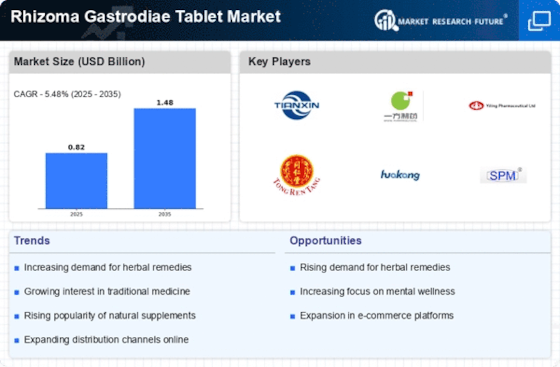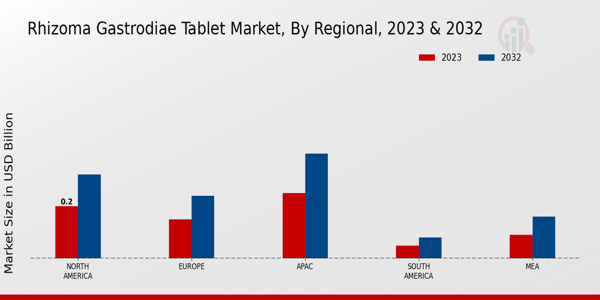Market Growth Projections
The Global Rhizoma Gastrodiae Tablet Market Industry is poised for substantial growth, with projections indicating a market size of 0.82 USD Billion in 2024 and an anticipated increase to 1.48 USD Billion by 2035. This growth trajectory reflects a compound annual growth rate (CAGR) of 5.49% from 2025 to 2035. The increasing acceptance of herbal remedies, coupled with rising health awareness and supportive regulatory frameworks, is likely to drive this expansion. As consumers continue to seek natural alternatives for health management, the market is expected to flourish, presenting opportunities for stakeholders across the industry.
Supportive Government Policies
Supportive government policies play a crucial role in the Global Rhizoma Gastrodiae Tablet Market Industry, as many countries are increasingly recognizing the importance of traditional medicine. Governments are implementing regulations that promote the use of herbal products, which enhances consumer confidence in their safety and efficacy. Initiatives aimed at integrating traditional medicine into national health systems are becoming more common, providing a favorable environment for the growth of herbal markets. This regulatory support is likely to facilitate market expansion, encouraging research and development in the field of herbal medicine, thereby potentially increasing the market size significantly in the coming years.
Innovations in Product Formulations
Innovations in product formulations are shaping the Global Rhizoma Gastrodiae Tablet Market Industry, as manufacturers strive to enhance the efficacy and appeal of their offerings. The development of advanced extraction techniques and the incorporation of complementary herbal ingredients are becoming prevalent, resulting in more potent and consumer-friendly products. These innovations not only improve the therapeutic potential of Rhizoma Gastrodiae tablets but also cater to diverse consumer preferences. As the market evolves, the introduction of new formulations is expected to attract a wider audience, thereby contributing to the projected CAGR of 5.49% from 2025 to 2035, indicating a promising future for the industry.
Increasing Demand for Herbal Remedies
The Global Rhizoma Gastrodiae Tablet Market Industry experiences a surge in demand for herbal remedies, driven by a growing consumer preference for natural and holistic health solutions. As more individuals seek alternatives to synthetic medications, the appeal of herbal products, including Rhizoma Gastrodiae, continues to rise. This trend is supported by increasing awareness of the potential side effects associated with conventional pharmaceuticals. In 2024, the market is projected to reach 0.82 USD Billion, reflecting a robust interest in herbal treatments. The shift towards natural products is likely to sustain growth in the industry as consumers prioritize wellness and preventive care.
Rising Incidence of Neurological Disorders
The Global Rhizoma Gastrodiae Tablet Market Industry is significantly influenced by the rising incidence of neurological disorders, such as epilepsy and migraines. These conditions have prompted a search for effective treatments, with Rhizoma Gastrodiae tablets being recognized for their potential therapeutic benefits. The increasing prevalence of these disorders, particularly in urban populations, has led to a greater acceptance of herbal solutions. As healthcare systems evolve, there is a growing emphasis on integrating traditional remedies into modern treatment protocols. This trend is expected to contribute to the market's expansion, with projections indicating a growth trajectory that could see the market reach 1.48 USD Billion by 2035.
Growing Health Consciousness Among Consumers
The Global Rhizoma Gastrodiae Tablet Market Industry is witnessing a notable shift towards health consciousness among consumers. As individuals become more aware of the impact of lifestyle choices on their well-being, there is a marked increase in the demand for natural health products. Rhizoma Gastrodiae tablets, known for their potential benefits in promoting neurological health, are gaining traction among health-conscious consumers. This trend is further amplified by the rise of social media and wellness influencers who advocate for natural remedies. The increasing focus on preventive healthcare is likely to drive sustained growth in the market, aligning with the broader global trend towards holistic health solutions.




